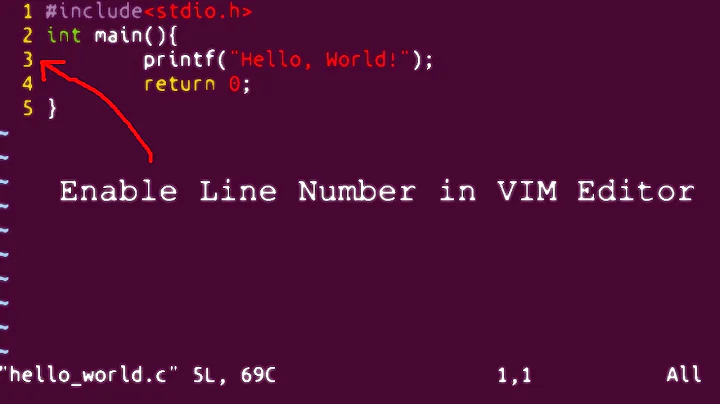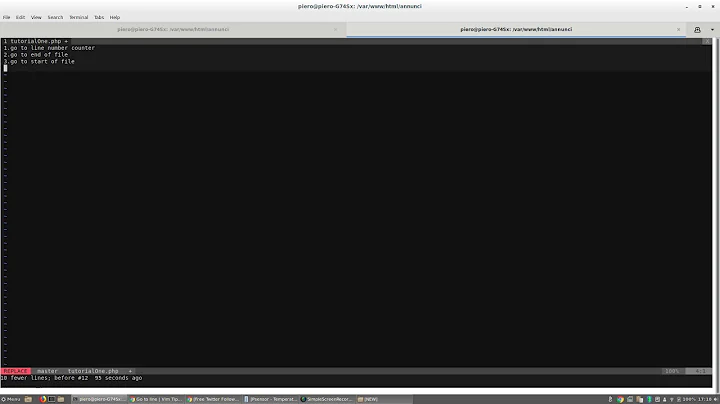Why would Vim add a new line at the end of a file?
Solution 1
All the answers I've seen here address the question "how could I prevent Vim from adding a newline character at the end of the file?", while the question was "Why would Vim add a new line at the end of a file?". My browser's search engine brought me here, and I didn't find the answer to that question.
It is related with how the POSIX standard defines a line (see Why should files end with a newline?). So, basically, a line is:
- 3.206 Line
- A sequence of zero or more non- <newline> characters plus a terminating <newline> character.
And, therefore, they all need to end with a newline character. That's why Vim always adds a newline by default (because, according to POSIX, it should always be there).
It is not the only editor doing that. Gedit, the default text editor in GNOME, does the same exact thing.
Edit
Many other tools also expect that newline character. See for example:
Also, you may be interested in: Vim show newline at the end of file.
Solution 2
Because vim is a text editor, it can sometimes "clean up" files for you. See http://vimhelp.appspot.com/vim_faq.txt.html#faq-5.4 for details on how to write without the ending newline, paraphrased below:
How do I write a file without the line feed (EOL) at the end of the file?
You can turn off the
eoloption and turn on thebinaryoption to write a file without the EOL at the end of the file:
:set binary
:set noeol
:wAlternatively, you can use:
:set noeol
:w ++bin
Solution 3
Adding a newline is the default behavior for Vim. If you don't need it, then use this solution: VIM Disable Automatic Newline At End Of File
To disable, add this to your .vimrc
set fileformats+=dos
Solution 4
You can put the following line into your .vimrc
autocmd FileType php setlocal noeol binary
Which should do the trick, but actually your approach is somewhat wrong. First of all php won't mind that ending at all and secondly if you don't want to save your changes don't press u or worse manually try to recreate the state of the file, but just quit without saving q!. If you left the editor and saved for some reason, try git checkout <file>
Related videos on Youtube
Buzu
Updated on July 09, 2022Comments
-
 Buzu 11 months
Buzu 11 monthsI work with Wordpress a lot, and sometimes I changed Wordpress core files temporarily in order to understand what is going on, especially when debugging. Today I got a little surprise. When I was ready to commit my changes to my git repository, I noticed that
git statuswas marking one of Wordpress files as not staged for commit. I remember I had reverted all the changes I did to that file before closing it, so I decided to usediffto see what had changed. I compared the file on my project with the file on the Wordpress copy that I keep in my downloads directory. It turns out the files differ at the very end.diffindicates that the there is a newline missing at the end of the original file:1724c1724 < } \ No newline at end of file --- > }I never even touched that line. The changes I made where somewhere in the middle of a large file. This leads me to think that vim added a newline character at the end of the file. Why would that happen?
-
 Peque almost 8 yearsThis is not a duplicate of VIM Disable Automatic Newline At End Of File. This question is asking about the reason: "why is Vim doing that?".
Peque almost 8 yearsThis is not a duplicate of VIM Disable Automatic Newline At End Of File. This question is asking about the reason: "why is Vim doing that?". -
 Buzu almost 8 yearsThank you Peque. It's the little details in the phrasing of sentences that make all the difference.
Buzu almost 8 yearsThank you Peque. It's the little details in the phrasing of sentences that make all the difference.
-
-
 Max over 10 yearsThat git solution there also looks very interesting.
Max over 10 yearsThat git solution there also looks very interesting. -
 Buzu over 10 yearsThanks, I was unaware that it was the default behavior for Vim.
Buzu over 10 yearsThanks, I was unaware that it was the default behavior for Vim. -
 Buzu over 10 yearsusing
Buzu over 10 yearsusingq!would not work, because at some point I already saved changes to that file. Otherwise I cannot see the result of the test I'm performing. I already knew how to recover the file, but did not know why Vim would add a newline character. Thanks for the line to add to the vimrc file. -
 Buzu over 10 yearsThanks for the answer, and for that link. It seems to be a very useful collection of FAQs.
Buzu over 10 yearsThanks for the answer, and for that link. It seems to be a very useful collection of FAQs. -
 Andrew Ferrier almost 10 yearsThis doesn't work for me. I have
Andrew Ferrier almost 10 yearsThis doesn't work for me. I havefileformatsset tounix,dos,mac(I'm on OS X), yet vim still add EOF lineendings as the OP describes. -
 Sergio Abreu over 6 yearsdidn't work here - linux ubuntu. I had to use set noeol binary as Max said below.
Sergio Abreu over 6 yearsdidn't work here - linux ubuntu. I had to use set noeol binary as Max said below. -
 Sergio Abreu over 6 yearsSometime one wants an editor that obeys exactly what the user has typed, and in the case he didn't enter a new line, so... this standard can produce shit if that new line was not expected. It is very specific cases, but I prefer to have new line only when I type it.
Sergio Abreu over 6 yearsSometime one wants an editor that obeys exactly what the user has typed, and in the case he didn't enter a new line, so... this standard can produce shit if that new line was not expected. It is very specific cases, but I prefer to have new line only when I type it. -
 Myles Prather over 2 yearsI learned the very hard way (2 hours of debug) that tcsh won't execute the last line of a script if it does not have a newline character. I was script-generating the tcsh script and forgot to add a final \n to the file. Then I noticed that if I just opened the file in vim and did nothing else except save it, it would suddenly start working.
Myles Prather over 2 yearsI learned the very hard way (2 hours of debug) that tcsh won't execute the last line of a script if it does not have a newline character. I was script-generating the tcsh script and forgot to add a final \n to the file. Then I noticed that if I just opened the file in vim and did nothing else except save it, it would suddenly start working.










